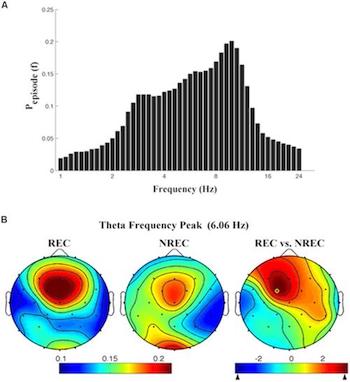State- or trait-like individual differences in dream recall: preliminary findings from a within-subjects study of multiple nap REM sleep awakenings

This study delves into the ability of people to recall their dreams with the aim of determining whether dream recall is based on “state- versus trait-like factors”. In other words, is the ability to recall dreams more dependent upon what state the brain is in just before awakening (state), or is it more based upon the brainwave patterns emitted by an individual on an ongoing basis (trait)? What are the factors that lead up to being able to remember one’s dreams?
The first point made is that an increase in the same frontal brainwave patterns present (theta waves) prior to being able to recall previously learned information during wakefulness are also increased just prior to being able to recall dreams when awoken during the study. This indicates that the state of mind before the beginning of a task is very important to memory performance relative to that task. As a result of these observations, this team of scientists were able to predict with a high degree of accuracy whether an individual will recall their dreams upon awakening, and how often this will occur.
These findings, although significant, did not answer the state- versus trait-like question.
The scientists were able to discover and isolate a kind of “background” signal from individuals’ brainwave patterns, and so were then able to study the other signals (electroencephalogram or EEG oscillations), apart from this during rapid-eye-movement (REM) sleep. One can think of this “background” signal as the steady “trait” of an individual, and the EEG oscillations as the passing “state” of the individual’s brainwave patterns at a given time. Thus, once the scientists were able to separate these two signals, they were able to set up an experiment to determine which one had more influence on memory recall during wakefulness and sleep.
The conclusion of the study indicates that the experiment not only identifies the presence of heightened right-frontal theta activity, a state-like phenomenon, to be predictive of dream recall. It also further supports the hypothesis of the continuity of neurophysiological processes across wakefulness and sleep with regard to the “encoding and retrieval of episodic memory”. Or, simply put, the same brainwaves predict memory recall for both wakefulness and sleep, suggesting that our consciousnesses do not cease while our physical bodies are asleep.
Copyright © 2026, SubtleRealm
